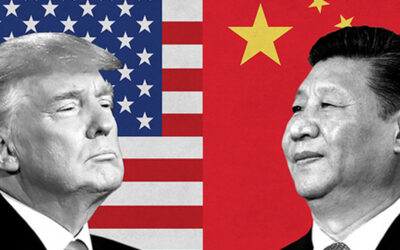Economic sanctions have long been wielded as a powerful tool in international relations, intended to coerce, deter, and compel states or entities into altering their behaviour without resorting to military conflict.
These financial penalties, trade restrictions, and asset freezes can reshape economies and influence geopolitical landscapes. Yet, their effectiveness and humanitarian impact remain subjects of intense debate.
In this article, we delve into the multifaceted world of economic sanctions, exploring their global implications through a journalistic lens.
The Mechanism and Historical Context
Economic sanctions are imposed by countries or international organisations to achieve foreign policy goals. These sanctions can be unilateral, such as those imposed by the United States, or multilateral, like those implemented by the United Nations or the European Union.
Sanctions typically include trade embargoes, asset freezes, travel bans, and restrictions on financial transactions. The underlying intent is to create economic hardship, thereby pressuring the target to change its policies or behaviour.

Economic sanctions have a storied history, with varying degrees of success. One of the most notable examples is the sanctions imposed on South Africa during the apartheid era. International pressure, including economic sanctions, played a pivotal role in dismantling apartheid, leading to the establishment of a democratic government in 1994.
In recent years, sanctions have become a central component of Western foreign policy, particularly in dealing with nations like Iran, North Korea, Russia, and Venezuela. The U.S. sanctions on Iran reimposed in 2018 after the withdrawal from the Joint Comprehensive Plan of Action (JCPOA), have significantly impacted the Iranian economy, leading to a sharp decline in oil exports and a devaluation of the Rial.
According to the World Bank, Iran’s GDP contracted by 6.8% in 2019, highlighting the profound economic impact of these sanctions.
The Economic and Humanitarian Impact
Conflict prevention is not just about avoiding wars; it’s about creating conditions for sustainable peace and development. According to the World Bank, the economic impact of violence globally was estimated at $14.5 trillion in 2020, equivalent to 10.6% of the world’s GDP.
Effective conflict prevention can save lives, reduce economic losses, and improve global stability. For example, the UN’s preventive diplomacy in the Gambia in 2016 helped avert a potential civil war, demonstrating the efficacy of timely and decisive intervention.
The efficacy of economic sanctions in achieving political objectives is often debated. While sanctions can cripple an economy and isolate a nation, their ability to effectuate political change is less certain. For instance, despite severe sanctions, North Korea continues its nuclear programme, and the authoritarian regime remains firmly in power. Moreover, sanctions can have unintended humanitarian consequences.

The World Food Programme reported that sanctions on Venezuela exacerbated food shortages, contributing to a humanitarian crisis with millions suffering from malnutrition. Similarly, in Iran, sanctions have limited access to essential medicines and medical equipment, adversely affecting public health.
Geopolitical Ramifications
Economic sanctions are not merely financial instruments; they are geopolitical tools with far-reaching implications. The sanctions on Russia following the annexation of Crimea in 2014 have strained relations between Moscow and the West, pushing Russia closer to China and other non-Western allies. This realignment has significant implications for global power dynamics, as seen in the increasing military and economic cooperation between Russia and China.
Furthermore, sanctions can create rifts within international alliances. The U.S. sanctions on Iran, for example, have caused friction between the United States and the European Union, as European countries have sought to maintain economic ties with Iran while navigating U.S. pressure.
Success Stories and Ethical Considerations
To understand the complex nature of economic sanctions, examining specific case studies is essential. The sanctions on Iraq in the 1990s, following its invasion of Kuwait, led to widespread debate. While the sanctions were intended to weaken Saddam Hussein’s regime, they also caused severe humanitarian suffering.
A UNICEF report estimated that half a million Iraqi children died as a result of sanctions-related malnutrition and disease. Conversely, the targeted sanctions on Libya in the early 2000s are often cited as a success story. The sanctions, aimed at curbing Libya’s weapons of mass destruction programme, eventually led to the disarmament and reintegration of Libya into the international community.
Financial institutions play a critical role in the implementation and enforcement of economic sanctions. Banks and other financial entities are required to comply with sanctions regulations, monitoring transactions and freezing assets as mandated.
Non-compliance can result in hefty fines, as seen in the case of BNP Paribas, which was fined $8.9 billion by the U.S. Department of Justice in 2014 for violating sanctions against Sudan, Cuba, and Iran.

The ethical implications of economic sanctions are profound. While intended to penalise regimes, sanctions often disproportionately affect ordinary citizens, exacerbating poverty and suffering. This raises critical questions about the morality of using economic sanctions as a tool of foreign policy.
Looking forward, the international community faces the challenge of designing sanctions that minimise humanitarian impact while maximising political pressure. The concept of “smart sanctions” or targeted sanctions aims to address this by focusing on specific individuals, entities, and sectors, thereby reducing collateral damage.
It is crucial for the international community to ensure that sanctions are not exploited by dominant powers for their own selfish interests or to manipulate global economic dynamics for their benefits
Final Thoughts
Economic sanctions remain a contentious yet indispensable instrument in the global diplomatic toolkit. Their ability to reshape economies, influence political behaviour, and alter geopolitical landscapes underscores their significance. However, the complex interplay of intended and unintended consequences necessitates a nuanced approach, balancing political objectives with humanitarian considerations.
Windear Consulting stands at the forefront of providing strategic insights and comprehensive analyses on the impact and effectiveness of economic sanctions. With our expertise, international organisations and policymakers can navigate the intricate dynamics of sanctions, ensuring informed and ethical decision-making in the pursuit of global peace and stability. For more detailed reports and tailored strategies, contact Windear Consulting today. Together, we can chart a course towards a more secure and just world.


